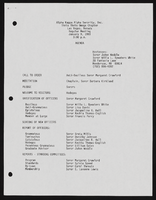Search the Special Collections and Archives Portal
Search Results
Flora and Stuart Mason Photographs and Event Programs
Identifier
Abstract
Collection is comprised of photographs of Las Vegas, Nevada community leaders Flora and Stuart Mason and three event programs from Temple Beth Sholom (Las Vegas, Nevada). Materials date from approximately 1965 to 2010.
Archival Collection
C. A. Earle Rinker Photograph Collection of Goldfield, Nevada
Identifier
Abstract
The C. A. Earle Rinker Photograph Collection of Goldfield, Nevada (approximately 1900-1915) contains individual black-and-white photographic prints, photographic albums, black-and-white and tinted postcards, and photographic negatives that document the history of early twentieth century Goldfield, Nevada. The images include photographic prints of Goldfield and surrounding areas during its peak years of 1906-1910; postcards showing scenes of Goldfield, Tonopah, and other areas in central Nevada; and negatives that contain images of Rinker's family and homelife in Indiana and Illinois.
Archival Collection
Jean Ford Papers
Identifier
Abstract
The Jean Ford Papers (1958-1996) include political documents, campaign materials for Jean Ford's political campaigns, and materials pertaining to campaign issues such as health services, general improvement districts, and parks and recreation. There is extensive material on Red Rock National Conservation Area, Lake Mead National Recreation Area, and the National Issues Forum. Women's issues cover the years 1964-1981 and contain information relating to the League of Women Voters, Equal Rights Amendment (ERA), and International Women's Year (IWY), as well as Anti-ERA and Anti-IWY materials.
Archival Collection

Alan Stock oral history interview: transcript
Date
Archival Collection
Description
Oral history interview with Alan Stock conducted by Barbara Tabach on December 27, 2017 for the Remembering 1 October Oral History Project. In this interview, Alan Stock discusses moving to Las Vegas, Nevada in 1999 for his job as a radio talk show host for KXNT. Stock describes the broadcast that covered the October 1, 2017 Las Vegas mass shooting from 11 PM on that night until 9 AM the next morning. He talks about some of the calls the station received from various members of the community, including survivors of the shooting, families of those at the event, people on lockdown in the nearby hotels, doctors, and general listeners. Stock describes some of the topics discussed on the broadcast, such as what was currently happening on the Las Vegas Strip, stories of the aftermath, and the support needed from the general public. Other topics include gun control and conspiracy theories. He discusses the impact this and other shootings would have on public affairs, including tighter security in daily living and public gatherings. He compares security in the United States to security in Israel and other countries, focusing on the idea of unconcealed guns worn in public. Throughout this interview, Alan Stock explains that the radio station's goal was to provide accurate information to the public during the aftermath of the October 1, 2017 mass shooting.
Text

Alpha Kappa Alpha Sorority, Theta Theta Omega Chapter meeting agendas
Date
Archival Collection
Description
From the Alpha Kappa Alpha Sorority, Incorporated, Theta Theta Omega Chapter Records (MS-01014) -- Chapter records file.
Text
John Ponticello Papers
Identifier
Abstract
The John Ponticello Papers are comprised of materials related to Ponticello's experiences in Las Vegas, Nevada between 1956 and 1971 with an emphasis on his Research Gambling Game Project, which he conducted and published between 1968 and 1971. The collection includes materials regarding gaming licenses and applications, research agreements, descriptions of the project, and publications about the research project. Also included are materials from Ponticello's experiences in Las Vegas such as business cards, county work cards, and souvenir photographs.
Archival Collection
Kane Springs Ranch Records
Identifier
Abstract
The Kane Springs Ranch Records (1930-2005) contain materials related to the Kane Springs Ranch in Meadow Valley Wash outside of Moapa, Nevada. The collection primarily focuses on the property itself, but also contains a genealogy of the Huntsman family, the ranch's first owners. Records include deeds and materials from the sale of the Kane Springs Ranch to the Bureau of Land Management in 2005. The bulk of the collection documents how the Bradley Stuart family used its resources from 1952 to 2003. These materials are related to water usage on the property and a rock and sand mining operation.
Archival Collection
Larry Ruvo oral history interview
Identifier
Abstract
Oral history interview with Larry Ruvo conducted by David G. Schwartz on January 27, 2009 for the Remembering Jay Sarno Oral History Project. Ruvo begins by discussing his position as a front desk clerk at Caesar’s Palace in Las Vegas, Nevada in the 1970s. Ruvo then describes how Jay Sarno changed the casino industry by designing Caesar’s Palace with a single theme. Ruvo then chronicles how gaming gradually was legalized in more areas throughout the world and how Sarno capitalized on making Caesar’s Palace an iconic casino which made people want to travel to Las Vegas. Lastly, Ruvo discusses Sarno’s focus on offering both gaming and entertainment options for guests at Caesar's Palace.
Archival Collection
Celesta Lowe oral history interview
Identifier
Abstract
Oral history interview with Celesta Lowe conducted by Patrick W. Canlton on February 06, 2002 for the Boyer Early Las Vegas Oral History Project. Lowe begins by discussing her early life in Baker, California and her father’s role as a station agent for the Tonopah Tidewater Railroad during the 1920s and 1930s. Lowe then describes her family moving to Las Vegas, Nevada in the 1940s. Lowe chronicles the process state legislatures took to open Nevada Southern University in 1957 and her role as an administrative assistant in the main office of the school. Lowe recounts her career at Nevada Southern University, the expansion of the campus, and renaming it University of Nevada, Las Vegas. Lastly, Lowe talks about her switch from an administrative assistant to a librarian at UNLV.
Archival Collection
